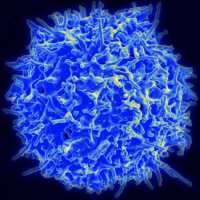The Cancer Survivors Network (CSN) is a peer support community for cancer patients, survivors, caregivers, families, and friends! CSN is a safe place to connect with others who share your interests and experiences.
Bone Marrow Transplant
Hello
I'm new to this community, I have finish 3 rounds Chemo (chop) for T cell Lymphoma i have 3 more to go i just had a Pet scan done and i am being told i am in remission but i am being told after the next 3 treatments I will need the bone marrow transplant because of the aggressive t cell Cancer
I am am told i will need to be in the hospital for 3 weeks and get very strong chemo and i truly am have a hard time on getting this treatment if i am in remission if anyone can share there experience
i would appreciate your incite, and i truly help i can be here to support others in this journey
thank you
Eileen
Comments
-
It is very good that you have responded so well to CHOP. It generally has a poor record against T-Cell Lymphomas - the only exception being ALCL ALK+ variety.
T-Cell Lymphomas are well known for relapsing. A stem cell transplant once in first remission is probably your best chance at a durable remission. The high intensity chemo prior to transplant is for short duration, and so does not cause the cumulative side effects of a longer regimen.
If you are in the US, I would hope that you are being treated at a major cancer facility, as they possess the most knowledge of the T-Cell Lymphomas. I underwent a related donor (half-match) transplant in 2015 and there has been no sign of lymphoma since.
-
Thank you for your feed back , I am in the US Denver Colorado , i feel i have very good Doctors here
and frankly i do feel very lucky that i responded so well to the Chop and i guess the best bet would be be for me to go the next step to keep it from coming back . I am also being told there is a national study going on right now on the bone marrow transplant that i have asked my doctors to look into .
I am happy to hear that you have not had a relapse and again thank you for your support
Eileen
-
hello
i do not mind you asking I have Peripheral T cell Lymphoma I am told it is very aggressive , and i got the impression my Doctor was a little shocked that i respond so well to treatment . you seemed to have a lot of knowledge i guess i need to do more research for myself to better understand what i am facing .
Eileen
-
For some perspective, I will try to condense the history of my malignancies. In 2008, after several misdiagnoses, I was finally diagnosed with both Peripheral T-Cell Lymphoma - Not Otherwise Specified, which was an unknown sub-type. It was at stage IV, with 50+ tumors and lymphoma in my bone marrow. It responded well to CHOP+Etoposide, but immediately relapsed. Thus, I was a poor candidate for a stem cell transplant. As well, no donor could be located. A clinical trial drug once again placed the Lymphoma in remission.
Five years later, it relapsed again. A portion of it had apparently mutated into Angioimmunoblastic T-Cell Lymphoma. I was at stage IV again, with about two dozen tumors and Lymphoma in my spleen and small intestine. To complicate matters, from 6 years of constant treatment, my marrow had developed Myelodysplastic Syndrome (MDS), a marrow cancer of myeloid blood cells which is related to, and a precursor of Leukemia. Eventually, it was three simultaneous cancers.
I read up much on the cancers and had an excellent hematologist. Ultimately, an experimental three drug regimen placed the Lymphomas in remission and greatly reduced the MDS. Having no siblings, my children were tested and both would be acceptable for a 5/10 transplant. I have been on immune suppression ever since, due to rejection issues.
You are indeed blessed to have such an excellent response.
-
You are very kind. There has been no sign of either lymphoma since 2015. The Myelodysplastic Syndrome took two years post-transplant to be eradicated. Today, it is difficult to tell whether the specifics of my condition are age related, treatment related, or both. However, most people who meet me do not suspect that I ever had cancer. I have had 16 years now that I would not otherwise have had, so that alone is something to celebrate.
-
Just to add a bit. There were no acceptable unrelated donors found for me in either 2009 or 2015. My only sibling passed in 1994. However, both of my children were tested and found to be acceptable as "half match" or 5/10 donors. 5 out of the 10 tissue factors they attempt to match for a successful marrow/stem cell transplant were my own, with the other 5 being those of my wife. There are complications from this, but they are surmountable.
As to transplant, note here that there are two general types of transplant: Autologous (your own stem cells) and allogeneic (related or unrelated donor stem calls). The point of transplant is to eliminate any genetic error in your marrow, causing it to produce malignant cells or cells with certain errors in them which will likely become malignant. Transplant replaces your immune system, which is generated in your marrow.
When you receive your own stem cells (autologous), there should be zero complications, as the procedure essentially "re-boots" your own immune system, so that it can begin producing healthy, non-malignant blood and immune cells. In lymphoma cases, once you have achieved first remission, it is held to be the best time to collect and transplant your own cells, which were harvested earlier - more about which if needed. Autologous transplants employ your own marrow cells, so that engraftment is pretty much a natural process.
As to allogeneic (donor) transplants, donor cells are not guaranteed to "engraft" in your marrow. I that occurs, it becomes an emergency and you are dependent upon transfusions. The benefit of donor transplant is that you receive your donor' immune system. It will be very good at recognizing and eliminating any cancer cells in your body. The downside is an acquired disease known as Graft-versus-Host-Disease. This occurs when a transplanted immune system produces immune cells that identify part of your body as foreign, and begin to attack it. This can be any tissue in the body, and each case is different. You will not have to worry about this.
At age 63, I underwent a "moderate intensity" transplant preparation, in which some of my marrow was left "alive" so as to provide for the generation of at least some blood cells in the transplant time period. Some younger or healthier patients receive a "myeloablative" preparation, in which their marrow is completely ablated (destroyed/neutralized) by radiation and high intensity chemotherapy so that the new immune system (stem cells) can move in and set up shop, so to speak.
It sounds daunting and worrisome, but transplants are routine now and dealing with any and all complications is well known. More as time progresses. Here is a link to a booklet produced by the Lymphoma Research Foundation which explains transplantation.
https://lymphoma.org/wp-content/uploads/2020/11/LRF-Transplant-Guide-2018.pdf
-
Hello
Thank you for all this information this really does help . they are going to use my own marrow for this treatment i meet with the specialist on Sept 17 so this information should help me with the questions i need to ask the Doctors . I am 66 years old and the youngest sibling so its not possible for a family donor , and frankly i would think if they can use my own its much better .
thank you
Eileen
-
Discussion Boards
- All Discussion Boards
- 6 Cancer Survivors Network Information
- 6 Welcome to CSN
- 122.7K Cancer specific
- 2.8K Anal Cancer
- 457 Bladder Cancer
- 313 Bone Cancers
- 1.7K Brain Cancer
- 28.6K Breast Cancer
- 408 Childhood Cancers
- 28K Colorectal Cancer
- 4.6K Esophageal Cancer
- 1.2K Gynecological Cancers (other than ovarian and uterine)
- 13.1K Head and Neck Cancer
- 6.4K Kidney Cancer
- 685 Leukemia
- 805 Liver Cancer
- 4.2K Lung Cancer
- 5.1K Lymphoma (Hodgkin and Non-Hodgkin)
- 243 Multiple Myeloma
- 7.2K Ovarian Cancer
- 72 Pancreatic Cancer
- 494 Peritoneal Cancer
- 5.7K Prostate Cancer
- 1.2K Rare and Other Cancers
- 544 Sarcoma
- 744 Skin Cancer
- 663 Stomach Cancer
- 194 Testicular Cancer
- 1.5K Thyroid Cancer
- 5.9K Uterine/Endometrial Cancer
- 6.4K Lifestyle Discussion Boards

